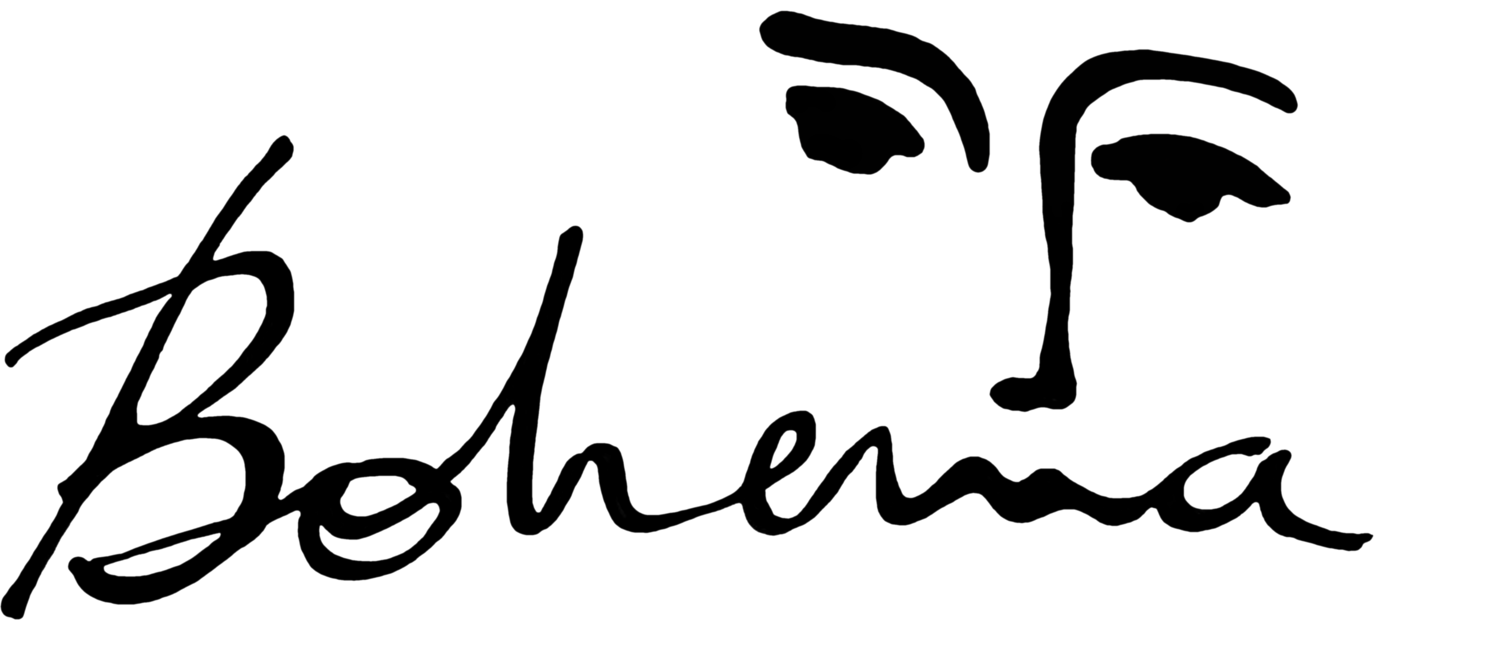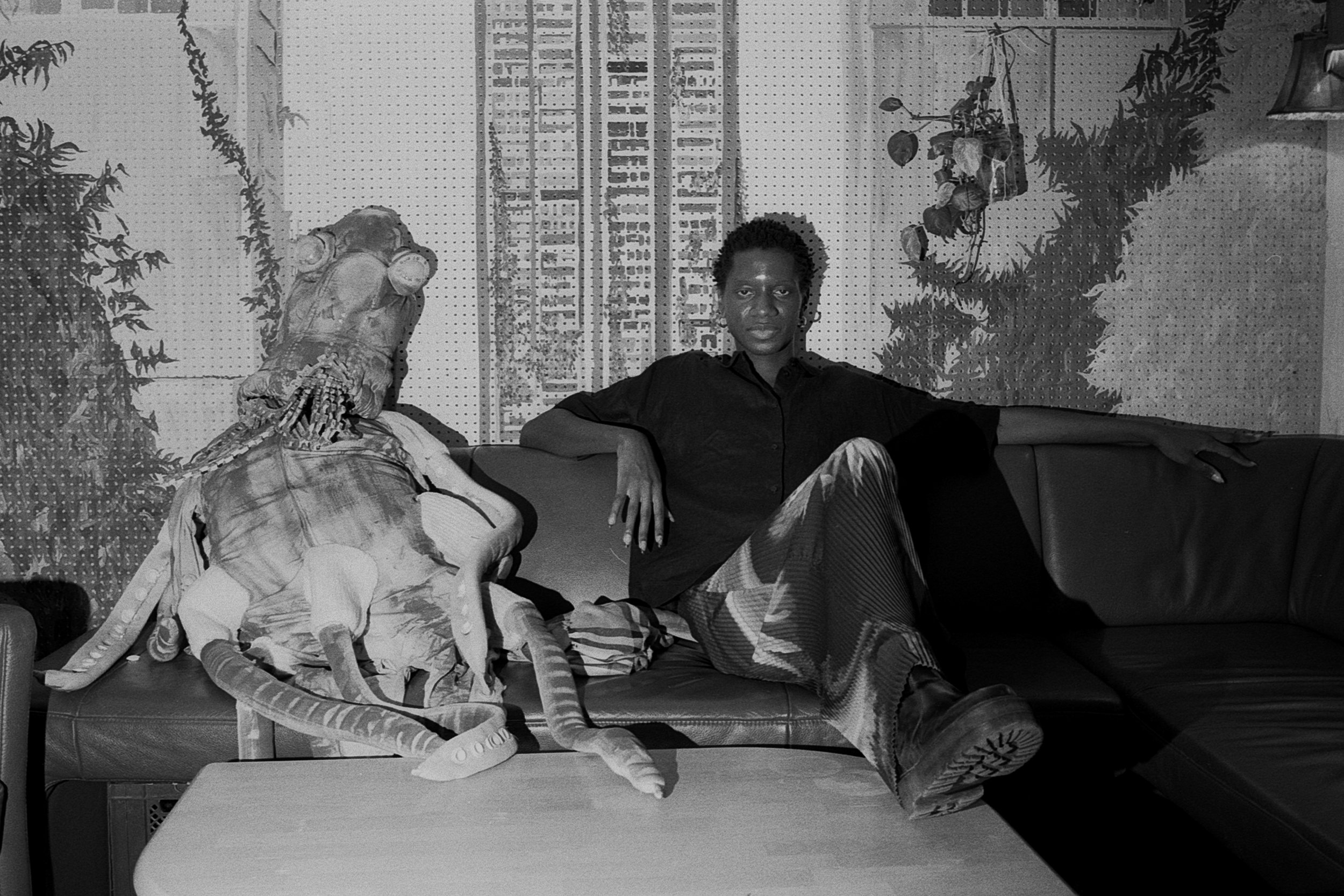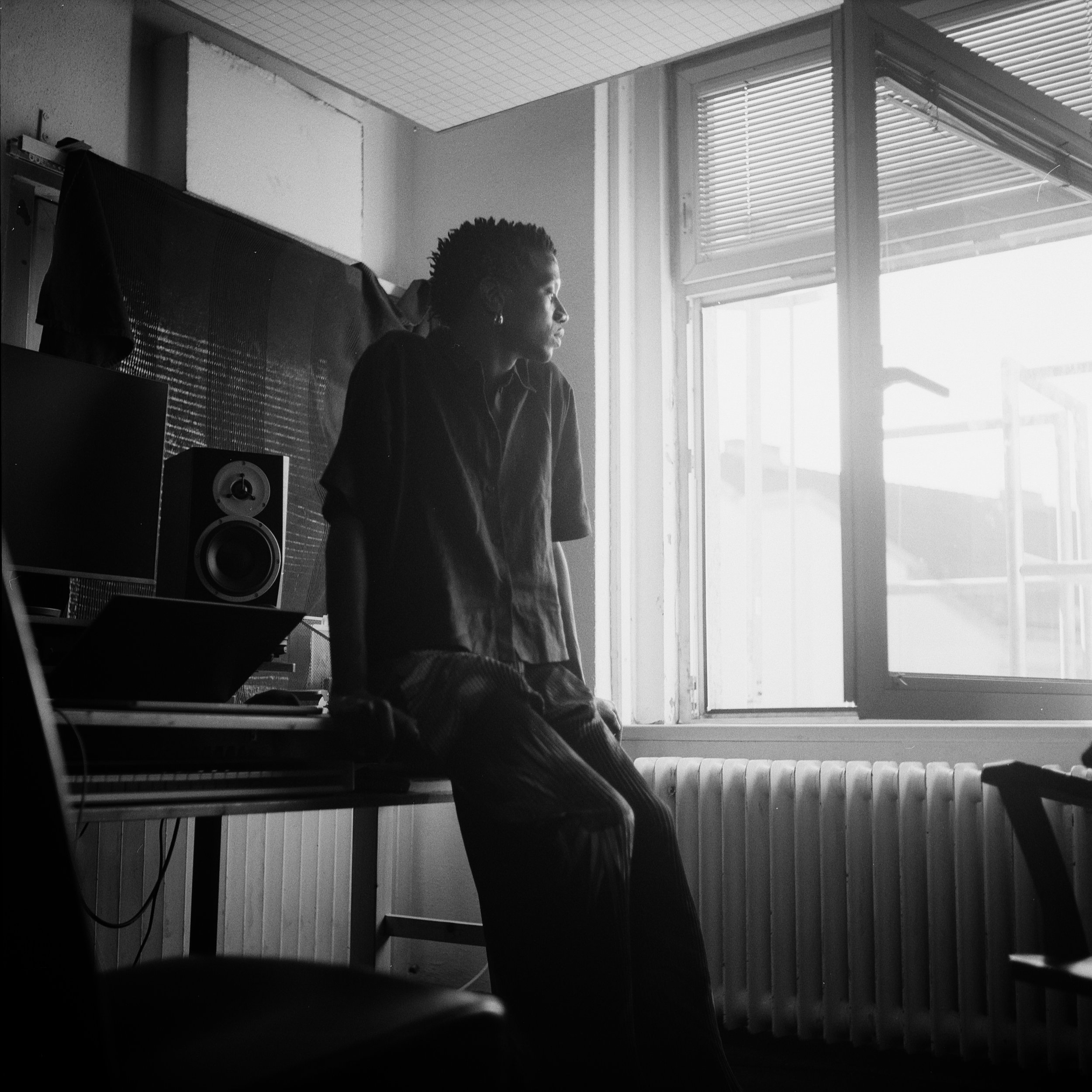Authentically Plastic: Disruptions to the softness
Electronic DJ & multidisciplinary artist Authentically Plastic on how their music is evolving during their residence in Vienna, their artist name emerging from the time as a drag performer, parties in Kampala as a safe space and the consequences of the tightened laws against queer people introduced in Uganda in 2023.
Authentically Plastic photographed in their studio in the Palais Rössl in Vienna. /// © Luca Wellenzohn
Authentically Plastic is an electronic DJ, producer, artist, performer and essayist from Kampala, Uganda, currently working in the Palais Rössl as part of the artist in residence programme of Kulturen in Bewegung. Between 2018 and 2023, Authentically Plastic organized a series of club nights called ANTI-MASS in Kampala, providing space for femme & queer artists in Uganda's increasingly repressive social climate. During the residence, they are working on new music for their new album. Throughout the residency, live performances and networking events are scheduled to facilitate creative and personal exchanges with local artists establishing sustainable connections and collaborations, for example, a collaborative performance with Tobias Raschbacher at Clišhé Träsh, which took place in May.
Listen to Authentically Plastic on Soundcloud: https://soundcloud.com/authenticallyplastic
Bohema: How has the previous time of your residency been and what are you working on right now?
Authentically Plastic: I have already been here for two months this summer and during this time I was creating new material for a second album that will hopefully be out in February next year. It’s still a work in progress, I’m using the space that I have here and working with the gear provided.
My previous music style has mostly been characterised by percussions and drums. Right now, I’ve been expanding my style and working more with melodies. I don’t know, maybe Vienna and its vibe are pulling these kinds of cute melodies out of me. (Laughs)
Bohema: So you didn't come here with the intention of incorporating more melodic aspects into your music, and it just developed while working on it here?
Authentically Plastic: Yeah. I got in the mood to make something softer, in a way.
B: What is the appeal of taking part in artist in residence programmes? Is this your first time?
AP: I’ve done several residence programmes around Europe; this isn’t even my first one in Vienna - I did a residency in the MQ in 2022. But during the current I am more focused on creating music specifically. I think residencies, especially this one right now, are very important to me in terms of having a stable place to make music and to work. My life usually is very hectic, I just came back from Australia last week. I’m not able to work while on the road. There are artists who can make music while changing places and I admire that, though. Some of them are like ‚I created this track in my hotel room while on tour in Shanghai‘. I am not that type of girl, I can’t do that. (Laughs)
B: So, you need more time in one place to focus better and to really find your way into a project?
AP: Exactly, at least two months of being based in one place.
B: Your previous music combines several genres in an experimental way; it has influences of techno, dark wave, Ugandan genres like Gqom - an electronic dance/house genre that originated in South Africa in 2010 -, just to name a few. I think it also has a dark and hypnotic touch to it.
What are your inspirations and influences for this new album?
AP: My influences are still the same, it’s just that the melodic aspect adds a different energy to it, a softness. Somebody described the tracks as being feminine, with a hard and dangerous aspect to it as well. That’s how my music develops right now: It’s softer, but there’s still noise in there, distortions, disruptions to the softness.
B: What is your approach on producing music, is it lots of pre-planning or more spontaneity, chance?
AP: I love that you say ‚chance‘, because that is kind of the magical word for me. I never approach a track like ‘ok, this is what I want to do and I’m going to do all these specific steps to get to that image that I created in my head’. My process rather very much depends on chance; I create a lot of noise, layer things on top of each other, and then I see what works. It is more a process of exploration.
Authentically Plastic during the interview in their studio provided by the residence programme. /// © Luca Wellenzohn
B: How did you come up with your artist* name ‚Authentically Plastic‘? Does it have a special meaning in relation to your artistic practice?
AP: I can’t remember exactly where I got the idea for the name, I think I read an article somewhere that said something about authentic and plastic. I was not making music yet at that time; I started as a drag performer. That name idea was perfect for that because you can associate plastic with make-up, wearing a mask. Later, when I went to start making music I decided to keep that name. For me, it’s become not so much about plastic as a material or it being synonymous to being fake, it’s more about neuronal plasticity. When you do electronic music, it is like rewiring the central nervous system.
B: So, first came the name and then the meaning developed while you grew into the name?
AP: Yes. I gave the name meaning afterwards.
B: How did you start with your drag performances and how does your drag practice intertwine with your other artistic practices as a multidisciplinary artist*?
AP: When I started DJing I incorporated drag into my music performances. I started doing so in Kampala, because it was a disruptive thing to do, it was shocking to people there. I like the idea of there being something in the performance that is a little bit disturbing and shocking. Gradually, as I’ve started performing more in Europe, I’ve not really been doing my performances in drag because in a new, foreign city I don’t have my community from home around me to protect me if something happened. Combining drag and music performances is something that is tied to the context of Uganda. Also, in Europe drag is not that shocking anymore. (Laughs)
‘these parties are an act of activism’
B: You co-created ANTI-MASS, a collective and label that organised a series of queer, femme party nights in varying locations in Kampala between 2018 and 2023, that were significant for the music and nightlife scene in the city. Could you describe how the vibe was during these parties, how the people were with each other?
AP: First of all, when we initiated the ANTI-MASS parties in 2018, it was a bit of a struggle to find a place to host them because of the anti-queer sentiment in Kampala. Eventually, an ally of us provided a rooftop in the outskirts of town as a location. It was important to us that the crowd was mixed and diverse, multifaceted, with queer people, straight people, gender nonconforming people, trans persons etc. The focus for the line-ups was mostly on femme and queer DJs. This created the message for queer people: ‚ok, these are parties for US‘. There were clear intentions and principles on which people we let into this safe space, people who weren’t conform with that were just not let in.
I remember friends of mine telling me that during these events they were able to let loose in a way that they’ve never been able before in this city. Also, DJs felt like they could play anything. There was freedom of expression for the audience and the performers. It all felt very exciting and edgy for Kampala standards, I haven’t experienced many other events like these in the city. It was a general feeling of possibility and a sentiment that it is an important thing to do for the community, creating these events where queer people can enjoy themselves and forget about the world outside. There were a bunch of queer activists who used to come to the parties, and they were telling me: ‚we know that you guys aren’t really activists by classical terms, but these parties are an act of activism‘.
© Luca Wellenzohn
B: Do you still work in Kampala right now?
AP: We don’t do parties in Kampala anymore right now, it’s just not safe anymore.
B: Because of the „Anti-Homosexuality Act, 2023“?
AP: Exactly. The last event that we hosted was New Year’s Eve 2022/23. By that time already, after the Covid-19 pandemic, there was a lot more police presence and surveillance directed at queer people. We used to have parties in various improvised locations, but this last party at New Year’s, we hosted in our private studio. There was a pressure from the outside already that was pushing us back in our private places as the only spaces where we could host a safe event.
The atmosphere right now has become too tricky and unsafe to do events, but I still go back to Uganda whenever I can. It inspires me just being there and having the networks and community there that helped me becoming an artist in the first place.
B: So, Uganda gives both possibilities/inspiration and limitations.
AP: Yes, the laws and negative attitudes against queer people have always been limiting, but I think me and my friends from the ANTI-MASS collective would agree that there was a sense of huge possibility musically, because of all the influences and inspirations we take from traditional and more contemporary Ugandan music. Also, a great thing about Kampala for me personally is having access to more space there. My access to spaces in Europe is more difficult, in financial and economic terms but also because of noise restrictions. In Kampala, there is always noise from everywhere, a default noise setting that makes it lively and that feels familiar to me.
© Luca Wellenzohn
B: With this new law, the „Anti-Homosexuality Act, 2023“, the already strong repression against the queer and LGBTQIA+ community in Uganda has been further intensified. How does it affect the artistic (queer) community there, what effects are being felt?
AP: This first year, since the law had passed, there was a wave of people in our community trying to relocate outside Kampala or even outside Uganda. Many queer people want to leave, because the pressure just becomes too much. We had started a fundraising campaign to help people relocate and we ended up raising around 60.000 pound. We could help around 20 people with that.
There is more and more negative awareness on the streets in terms of people looking out for signs of queerness in other people. Whereas before, I have been able to walk down the street, and people would think that I am just an eccentric person. There are many people in our community whose private homes and safe spaces have been raided by the police, for example a shelter for LGBTQIA+ people that we have worked with recently, located in the neighborhood where our studio is based. This is just one of many examples of what people are experiencing. It is a trying time for all of us, it put a stop to our collective experimentation. Right now, our priority is just being there for each other, addressing any emergencies and injustices and fundraising money for wherever it is needed.
B: Is there a place to find and support these fundraising campaigns?
AP: It has become trickier to find organizations for fundraising because the government started restricting them and revoking their operating rights. Many had to shut down their websites. But there still are some possibilities to support, for example a fundraiser for an LGBTQIA+ shelter that is run by friends of our ANTI-MASS collective.
B: In my research I came across many interesting artists, a lot of whom explore Ugandan culture in their artistic processes, like traditional dances, music or cultural aspects. Feel free to namedrop some of your favourite artists at the moment.
AP: Some of my favourite artists right now are Nsasi, they just had their debut album Coinage released, Turkan and Gerald Raldy Odil.
To not only name music artists I would also recommend the poet Gloria Kiconco. She writes amazing poetry and has done great pieces capturing queer existence in Kampala; she also wrote about our ANTI-MASS parties. I keep pushing her to release the poems publicly.
Right now, Nsasi, Gloria and I are applying for fundings to work together on a project that combines sound and poetry. We continue our creative work.
————
Upcoming events of Authentically Plastic in Vienna:
Authentically Plastic @ WIENWOCHE opening, 13.09.2024, 18:00-22:00
U-Bahnbogen 28, 1080 Wien
Authentically Plastic @ CIVA Festival
Urban Encounters: The Potential of Non-Commercial Creative Space
As part of the Contemporary Immersive Virtual Art Festival (CIVA) in cooperation with VIDC, 05.10.2024, Blickle Kino, Belvedere 21, Arsenalstraße 1, 1030 Wien





